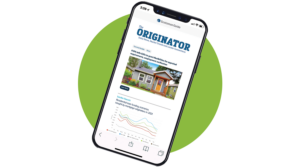Debt Service Coverage Ratio (DSCR) loans are a powerful tool for real estate investors seeking to grow their portfolios of investment properties. For mortgage brokers, understanding the nuances of DSCR loans, including loan requirements, types of properties, and the pros and cons of DSCR loans, is essential to helping clients secure competitive financing. This guide explores everything you need to know about DSCR loan programs. You will learn how to work with DSCR lenders, and why these loans are a valuable resource for real estate investors in the USA.
What Is a DSCR Loan?
A DSCR loan, is a type of financing designed for real estate investment. Unlike traditional mortgages, which assess a borrower’s personal income, DSCR loans evaluate the property’s cash flow.
DSCR Loan Requirements
The DSCR formula measures a property’s ability to generate enough income to cover its mortgage payments. It is calculated by dividing the Net Operating Income (NOI) by the Total Debt Service (TDS).
- Net Operating Income: the property’s total income after subtracting operating expenses, such as maintenance, property taxes, and management fees.
- Total Debt Service: the total annual payments required for the property’s loan, including both principal and interest.
The DSCR tells you how many times the property’s income can cover its debt obligations. A DSCR greater than 1.0 means the property generates enough income to cover its debt payments. However, a DSCR less than 1.0 indicates that the income falls short of the debt obligations. For example, a DSCR of 1.25 means the property generates 25% more income than is needed to cover its debt payments.
Types of Properties Suitable for DSCR Loans
These loans offer versatile financing options for a variety of investment properties, including:
- Residential Rental Properties: Single-family homes, duplexes, triplexes, and other rental properties.
- Multi-Family Properties: Apartment buildings and other multi-unit investments are excellent candidates for DSCR loan programs.
- Commercial Properties: DSCR direct lenders in the USA often provide financing for commercial spaces like office buildings and retail stores.
- Mixed-Use Properties: Properties with both residential and commercial units, such as apartments above retail shops, are also eligible.
For these properties, the income generated must meet the lender’s DSCR loan requirements to qualify for favorable terms.
Benefits of DSCR Loans
DSCR loans provide significant advantages to real estate investors, making them a preferred option for financing income-generating properties. Here are the key benefits:
1. Income-Based Qualification
Unlike conventional mortgages that require proof of personal income, borrowers can qualify for a DSCR based on the property’s income. This makes them ideal for self-employed individuals or those with non-traditional income sources.
2. Streamlined Documentation
The focus on the property’s income potential reduces the need for extensive personal financial documentation. Borrowers typically need to provide rental agreements, income statements, and market rent projections.
3. Flexibility for Multiple Properties
Unlike conventional loans, these loan programs don’t impose strict limits on the number of properties an investor can finance. This flexibility allows them to expand their portfolios without being constrained by debt-to-income ratios.
4. Competitive DSCR Loan Terms
While this type of loan may have slightly higher interest rates than traditional loans, they offer customized terms that suit an investor’s goals. This means that investors can get a loan that helps them focus on cash flow or property appreciation.
5. Faster Closing
With fewer documentation requirements, DSCR lenders can process loans quickly. This enables investors to act swiftly on lucrative opportunities, especially in competitive real estate markets.
DSCR Loan Pros and Cons
Before diving into a DSCR loan program, it’s essential to weigh the benefits and potential drawbacks.
Pros of DSCR Loans
- No Personal Income Requirement: Qualification is based on the property’s cash flow, not the borrower’s income.
- Simplified Process: Streamlined documentation makes the application process quicker and easier.
- Portfolio Growth: Investors can finance multiple properties without hitting conventional loan limits.
- Customizable Terms: DSCR direct lenders in the USA often offer flexible terms to meet investors’ needs.
Cons of DSCR Loans
- Higher Interest Rates: Compared to traditional loans, DSCR loans may have slightly higher rates.
- Higher Down Payments: Many DSCR mortgage lenders in the USA require larger down payments, typically 20% or more.
- Property-Dependent Qualification: If a property’s income is inconsistent, it may not meet the DSCR required for approval.
How Mortgage Brokers Can Help Clients with DSCR Loans
For mortgage brokers, understanding these loan programs and working with lenders that offer them, helps them better serve their clients. Here’s how brokers can use these loans to benefit their clients:
1. Expanding Financing Options
Brokers with knowledge of DSCR loan programs can help clients who may not qualify for traditional loans. These loans open doors for wider range of real estate investors, including those with income verification challenges.
2. Supporting Portfolio Growth
Brokers can assist clients in financing multiple properties using these loans, enabling them to grow their portfolios.
3. Working with the Right Lenders
Partnering with DSCR lenders ensures clients receive competitive rates and favorable terms. Brokers can leverage these relationships to simplify the loan process for their clients.
4. Educating Clients
Mortgage brokers can guide clients through the DSCR loan requirements and help them understand how they can benefit from these loans. This builds trust and positions brokers as valuable resources for investors.
DSCR Loans vs. Traditional Mortgages
Understanding the differences between DSCR loans and traditional loans is critical for brokers and investors:
- DSCR Loans: Qualification is based on property income, with minimal personal financial documentation required. These loans are ideal for income-generating properties.
- Traditional Loans: Rely on personal income, debt-to-income ratios, and employment verification. This makes them better suited for primary residences.
For investors focused on cash flow and portfolio expansion, DSCR loans provide unmatched flexibility compared to traditional financing.
Conclusion
DSCR loans are an essential financing tool for real estate investors and a valuable offering for mortgage brokers. By understanding the DSCR loan requirements, property eligibility, and the pros and cons of these loans, brokers can better serve a diverse client base. Partnering with lenders that offer DSCR loans ensures brokers stand out in the competitive real estate financing industry.
With their focus on property income and streamlined application process, DSCR loans offer a path to success for investors and a unique opportunity for brokers to build lasting client relationships.


